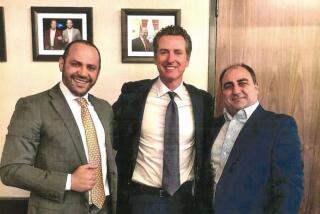Bank Loans Tied to Financing for Scud Missile Project : Hearing: For the first time, U.S. government publicly links aid provided by Atlanta branch manager to an Iraqi military program.
ATLANTA — Loans from an Italian bank branch here paid for improving Iraqi Scud missiles like the one that killed 28 American soldiers in the Persian Gulf War, a top federal investigator testified Tuesday.
The testimony came on the second day of a sentencing hearing for Christopher P. Drogoul, the banker who made the loans. It marked the first time that the government has publicly described a specific military project financed by Iraq with $5 billion in loans from the Atlanta branch of Italy’s Banca Nazionale del Lavoro.
The disclosure raises the stakes in the case. If Drogoul’s lawyer can convince the federal judge that the U.S. government knew of the loans, as he contends, the Bush Administration could face heavy political fallout from the case. However, if prosecutors succeed in portraying Drogoul as the scheme’s lone mastermind, the judge would be hard pressed to reduce the prison term of life without parole that he faces.
Drogoul pleaded guilty to money laundering, conspiracy and other charges in connection with the loan scheme in a plea bargain with the government. But prosecutors say he has failed to cooperate fully and they are seeking a harsh prison term.
Bobby Lee Cook, Drogoul’s lawyer, hopes to persuade U.S. District Judge Marvin H. Shoob to give his client a lesser sentence by proving that the loans were carried out with the approval of BNL superiors and the knowledge of U.S. officials.
The financing for the missile project was described by Arthur J. Wade, the Agriculture Department criminal investigator who has headed the investigation of the multibillion-dollar loan scheme.
Wade said that Drogoul learned BNL loans had financed military projects when he visited Baghdad for an arms fair in April, 1989. During the visit, the banker was escorted by Safa al-Habobi, a top official in Iraq’s worldwide arms procurement network and a customer of Drogoul’s.
Habobi took Drogoul on a tour of a military facility and pointed out various projects paid for with BNL loans, according to Wade. One large room at the plant was filled with engineers and draftsmen, with drawings of the missile on the walls.
“The missile they were talking about was the al-Hossein, the improved version of the modified Scud B used against American forces in the Persian Gulf War,” Wade said.
Wade described other military projects paid for with BNL loans but none were as deadly as the Scud. A version of the missile slammed into a barracks housing U.S. soldiers in Saudi Arabia on Feb. 25, 1991, killing 28 in the worst incident of the war for allied troops.
Wade said that Drogoul loaned Iraq another $330 million between his visit to the missile plant and the discovery of the loan scheme in August, 1989.
The government continued to press its case that Drogoul was the mastermind of the loan scheme. In a written statement to his own lawyers in September, 1989, a month after FBI agents had raided the bank here, Drogoul said that no one else within BNL was aware of the Iraqi lending.
“I cannot state that the bank was aware of our activities, but there were tell-tale signs all over,” he said.
In his testimony, Wade described a labyrinth of foreign and U.S. bank accounts through which Drogoul and the Iraqis successfully concealed his lending from BNL officials outside of Atlanta.
But Shoob was skeptical when Wade told him that the scheme was so sophisticated that it could not be picked up by U.S. intelligence agencies monitoring international communications.
A key element of the government’s case against Drogoul was that he was making loans to Iraq during a period in which few other banks in the world were willing to advance money to the financially troubled Middle East nation.
To prove the point, Wade said that investigators found only one other bank in the United States that made a commercial loan to Iraq in 1988 and 1989. And that loan was a fully secured, $10-million transaction with 48% annual interest, he said. By contrast, he said, Drogoul provided Iraq with billions in unsecured loans at tiny interest rates.
Wade cited a 1989 analysis by the U.S. Export-Import Bank called “The Mythology of Iraq,” which concluded that Iraq was not a good credit risk and recommended against any further U.S. loans to Baghdad.
“The mythology is actually very good in dispelling some of the myths,” Wade said.
The testimony was at odds with statements by Bush Administration officials who have defended the decision to provide Iraq with an additional $1 billion in loan guarantees in November, 1989.
Testifying before the House Banking, Finance and Urban Affairs Committee in May, now acting Secretary of State Lawrence S. Eagleburger and other officials said that Iraq had consistently repaid its U.S. debts.
But Wade said in the courtroom that, by 1989, Iraq was repaying loans only to creditors who provided new money. He said that Drogoul found himself in that bind earlier in 1989.
The Iraqis had asked for a new loan of $1.1 billion and had started to withhold payments on earlier BNL loans until Drogoul approved the new package. The delays, Wade said, were “a reminder.”
More to Read
Sign up for Essential California
The most important California stories and recommendations in your inbox every morning.
You may occasionally receive promotional content from the Los Angeles Times.










